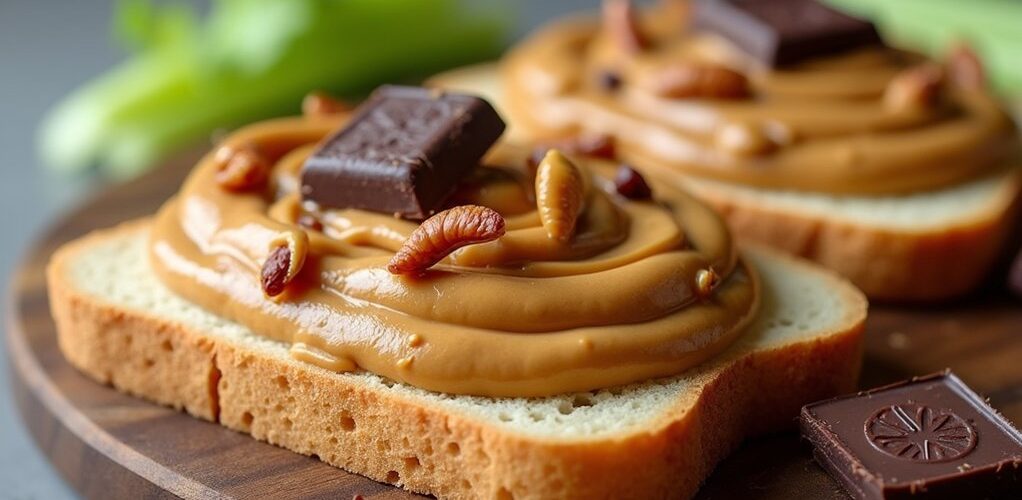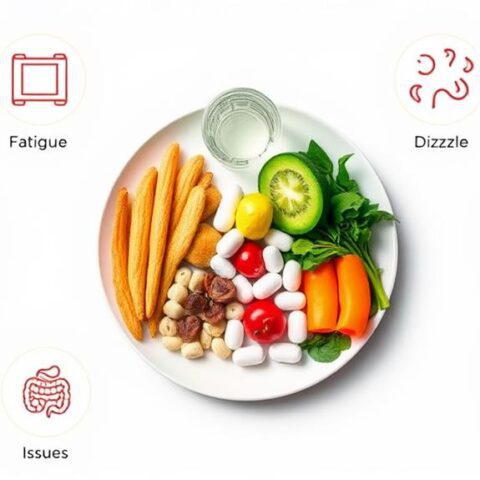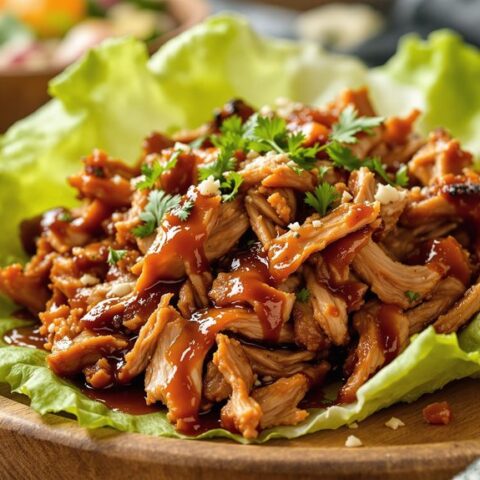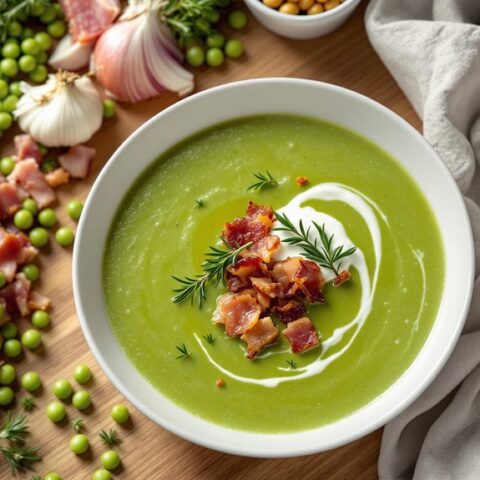
Peanut butter can indeed fit into a low-carb diet, containing only 4-5 net carbs per two-tablespoon serving. Natural varieties with just peanuts and salt offer the best carb profile, while processed options may include hidden sugars. The high protein and healthy fat content promotes satiety and stable blood sugar levels, making it a nutritious choice for low-carb dieters. Proper portion control and label reading are essential for successfully incorporating this satisfying spread into a carb-conscious lifestyle.
Key Takeaways
- Peanut butter is suitable for low-carb diets, containing only 4-5 grams of net carbs per 2-tablespoon serving when choosing natural varieties.
- Natural peanut butter provides 8 grams of protein and 16 grams of healthy fats, making it a nutritious choice for low-carb dieters.
- Choose all-natural peanut butter containing only peanuts and salt to avoid hidden sugars and unnecessary carbohydrates from additives.
- Strict portion control is essential, as recommended servings are 1-2 tablespoons to maintain low daily carb intake.
- Peanut butter's low glycemic index of 14 helps maintain stable blood sugar levels while providing sustained energy on low-carb diets.
The Truth About Peanut Butter's Carb Content
When it comes to incorporating peanut butter into a low-carb diet, understanding its true carbohydrate content is essential for making informed dietary choices. A typical 2-tablespoon serving contains approximately 6-7 grams of total carbohydrates, with 2.7 grams of fiber, yielding about 5 grams of net carbs, making it relatively low in carbs for those monitoring their intake. The type of peanut butter chosen greatly impacts its carbohydrate profile. All-natural varieties containing only peanuts and salt offer the most favorable option, rich in healthy fats without added sugars. Conversely, reduced-fat versions often compensate with higher carbohydrate content. Consumers should carefully check product labels, as various brands may include additional ingredients that increase the total carb count, potentially affecting their dietary goals. It's crucial to be aware of hidden sugars that may appear under various names, as they can inadvertently increase carb intake and derail low-carb efforts.
Why Peanut Butter Works on a Low-Carb Diet
Peanut butter's balanced combination of healthy fats, protein, and minimal carbohydrates makes it an excellent choice for low-carb dieters seeking nutritional variety. The high fat content promotes feelings of fullness, while the low net carb count allows for flexible meal planning without compromising daily carbohydrate limits. Success with peanut butter on a low-carb diet depends on careful portion control, with measuring tools and pre-portioned servings helping maintain the recommended serving size of 1-2 tablespoons. The ketogenic diet reduces carbohydrate intake, leading to lower insulin production and enhanced insulin sensitivity, which can further support appetite regulation when incorporating foods like peanut butter.
Macro Balance Benefits
Despite its creamy richness, peanut butter emerges as an ideal companion for low-carb dieters due to its exceptional macro balance.
With 8 grams of protein and 16 grams of healthy fats per serving, it delivers substantial nutritional value while keeping carb counts manageable at 6-7 grams per two tablespoons.
The combination of protein and fats creates a satisfying effect that supports muscle maintenance and promotes feelings of fullness, essential aspects of a successful low-carb diet.
Its low glycemic index of 14 guarantees steady blood sugar levels, while the presence of fiber further enhances its nutritional profile.
When choosing all-natural varieties without added sugars, peanut butter fits seamlessly into daily macro targets, providing sustained energy without compromising carbohydrate restrictions.
Portion Control Strategies
Successful integration of peanut butter into a low-carb diet hinges on mastering portion control techniques. Understanding serving size and implementing monitoring strategies helps maintain carbohydrate limits while enjoying peanut butter in moderation. Choosing all-natural peanut butter and utilizing precise measuring tools guarantees the best results.
| Strategy | Implementation |
|---|---|
| Measuring Tools | Use tablespoon measures consistently |
| Pre-portioning | Divide into single-serve containers |
| Product Selection | Choose unsweetened varieties only |
| Visual Guidelines | Learn to recognize proper portions |
| Tracking Method | Log daily intake in food diary |
These portion control practices allow individuals to incorporate peanut butter effectively while adhering to low-carb dietary guidelines. By maintaining awareness of serving sizes and selecting appropriate products, dieters can enjoy this nutrient-dense food without compromising their health goals.
Choosing the Right Peanut Butter for Keto Success
Selecting the right peanut butter for a ketogenic diet requires careful attention to ingredient labels, as many commercial brands contain hidden sugars and additives that can derail low-carb goals. Natural peanut butter varieties, containing only peanuts and possibly salt, offer the cleanest nutritional profile for maintaining ketosis and meeting macronutrient targets. While processed options might seem convenient, their added sweeteners and hydrogenated oils can greatly increase carbohydrate content, making them less suitable for a ketogenic lifestyle. It's essential to be cautious of hidden sugars and carbs in peanut butter, as they can affect ketosis similarly to other non-keto-friendly sweeteners.
Read Labels Carefully First
While peanut butter can be a delicious addition to a low-carb diet, reading nutritional labels carefully becomes essential for making the right choice.
When examining labels, consumers should focus on finding products that contain only peanuts and possibly salt, steering clear of varieties with added sugars like honey or molasses. Many commercial brands can be misleading, making it vital to look specifically for "no added sugars" on the packaging.
For accurate carb counting, verify that a standard serving size of 1-2 tablespoons contains approximately 6-7 grams of total carbohydrates.
Be particularly cautious with reduced-fat versions, as these often compensate with additional ingredients that increase the net carb content. The ideal peanut butter for a low-carb diet will have around 5 grams of net carbs per serving.
Natural vs. Processed Options
The distinction between natural and processed peanut butter varieties plays a crucial role in maintaining ketogenic and low-carb dietary goals.
Natural peanut butter, containing only peanuts and possibly salt, delivers approximately 4-5 grams of net carb count per two-tablespoon serving, making it an excellent choice for carb-conscious consumers.
In contrast, processed peanut butters often include added sugars, honey, or hydrogenated oils that can greatly increase their carbohydrate content. These additions make them less suitable for low-carb eating plans.
Smart consumers should carefully examine the ingredient label before making a selection, focusing on products with minimal ingredients.
When incorporating peanut butter into a low-carb lifestyle, choosing all-natural varieties and maintaining proper portion control guarantees maximum nutritional benefits while staying within daily carbohydrate limits.
Watch Those Hidden Sugars
Successful keto and low-carb dieters must remain vigilant about hidden sugars lurking in commercial peanut butter products. Many manufacturers add sweeteners like honey or molasses, which can greatly increase the carb count and potentially derail dietary goals.
When shopping for peanut butter, carefully examine the nutritional label for total carbohydrates and added sugars.
- Choose all-natural varieties containing only peanuts and salt
- Stick to recommended serving sizes of 1-2 tablespoons
- Be wary of "sugar-free" claims, as products may still contain high-carb ingredients
- Compare brands to find options with the lowest total carbohydrates
While regular peanut butter typically contains 7 grams of carbs per serving, those with added sugars can exceed this amount, making it essential to select products that align with low carb diet requirements.
Smart Portion Sizes for Low-Carb Living
Mastering portion control stands as a cornerstone of successful low-carb eating, particularly when incorporating nutrient-dense foods like peanut butter into one's diet. When following a low-carb diet, measuring out 1-2 tablespoon servings of all-natural peanut butter helps maintain proper portion sizes while staying within daily carb limits. To further support long-term success, meal variety can prevent dietary monotony and enhance satisfaction with your diet. Rather than eating directly from the jar, using proper measuring tools guarantees accurate portion control and prevents overconsumption of both carbohydrates and calories, making peanut butter a sustainable addition to any low-carb lifestyle.
| Serving Size | Total Carbs | Net Carbs | Calories |
|---|---|---|---|
| 1 tbsp | 3g | 2g | 95 |
| 2 tbsp | 6g | 4g | 190 |
| 3 tbsp | 9g | 6g | 285 |
| 4 tbsp | 12g | 8g | 380 |
Natural vs. Processed: Which Peanut Butter to Choose
Making informed choices between natural and processed peanut butter varieties can greatly impact the success of a low-carb eating plan.
Natural peanut butter, containing only peanuts and occasionally salt, offers superior nutritional value with healthy fats and protein while keeping carbohydrates minimal. In contrast, processed peanut butter often includes added sugars and fillers that can increase the carbohydrate content.
- Check ingredients lists for pure peanut content without additives or sweeteners
- Compare nutrition labels, aiming for options with 6-7 grams of carbohydrates per serving
- Look for natural separation of oils, indicating minimal processing
- Avoid products containing hydrogenated oils or corn syrup sweeteners
Selecting the right peanut butter can also help avoid potential nutrient deficiencies commonly associated with low-carb diets. When selecting peanut butter for a low-carb lifestyle, choosing all-natural varieties helps maintain nutritional goals while providing satisfying flavor and sustained energy.
Delicious Ways to Enjoy Peanut Butter on Keto
While peanut butter might seem like a restricted food on a ketogenic diet, there are numerous creative and delicious ways to incorporate this protein-rich spread into low-carb meal plans. Health-conscious individuals can enjoy peanut butter in various forms, from spreading it on celery sticks for a quick snack to incorporating it into homemade keto-friendly desserts and smoothies. The key is maintaining portion control, as peanut butter's caloric density can impact weight loss goals when consumed excessively. For best results on a low-carb diet, choosing natural, unsweetened peanut butter made from pure peanuts is essential. This versatile ingredient can transform ordinary recipes into satisfying treats, whether blended into fat bombs, mixed into cookies, or simply paired with low-carb vegetables for a wholesome snack option. Supplementing with digestive enzymes can enhance nutrient absorption when incorporating peanut butter into a keto lifestyle.
Understanding Net Carbs in Peanut Butter
When counting carbohydrates on a low-carb diet, understanding the concept of net carbs in peanut butter becomes crucial for accurate meal planning. A typical 2-tablespoon serving contains approximately 7 grams of total carbohydrates, but the presence of fiber reduces the net carbs to around 4 grams.
To maintain a successful low-carb lifestyle while enjoying peanut butter, consider these key points:
Following these essential guidelines ensures you can savor peanut butter while staying committed to your low-carb dietary goals.
- Choose all-natural peanut butter without added sugars to minimize carbohydrate content
- Calculate net carbs by subtracting fiber from total carbohydrates
- Monitor portion sizes carefully to avoid exceeding daily carb limits
- Select verified low-carb options like Peanut Butter & Co. Simply Smooth, which contains approximately 4 grams of net carbs per serving
These guidelines help guarantee peanut butter can be incorporated effectively into a low-carb eating plan. For those following a keto diet, complementing peanut butter with low-carb vegetables like spinach or zucchini can further enhance meal variety while keeping carb counts low.
Best Practices for Incorporating Peanut Butter
Successful incorporation of peanut butter into a low-carb diet requires careful attention to portion control, with daily servings limited to 1-2 tablespoons to maintain appropriate carb levels.
When selecting peanut butter varieties, consumers should focus on all-natural options without added sugars or artificial ingredients, ensuring ideal nutritional value while minimizing unnecessary carbohydrates.
Regular measuring of portions using proper kitchen tools, rather than estimating by eye, helps prevent overconsumption and supports adherence to daily carb restrictions.
Measure Your Daily Portions
Proper portion control stands as an essential element when incorporating peanut butter into a low-carb diet. With two tablespoons containing approximately 4 grams of net carbs, measuring out servings helps maintain daily carbohydrate goals while enjoying this nutrient-dense food.
Choosing all-natural peanut butter and practicing portion awareness guarantees peak nutrition without compromising dietary objectives.
Key practices for portion control include:
- Use measuring spoons instead of eating directly from the jar
- Pre-portion servings into small containers for grab-and-go snacks
- Track daily intake to stay within carbohydrate limits
- Combine measured portions with other low-carb foods for balanced meals
These strategies help maximize the benefits of peanut butter while maintaining a successful low-carb diet plan.
Choose Natural Peanut Options
Beyond measuring portions, selecting the right type of peanut butter makes a significant impact on a low-carb diet's success.
When choosing natural peanut options, consumers should focus on products containing only peanuts and possibly salt, avoiding varieties with added sugars like honey or molasses that can increase carb content.
Reading labels carefully helps identify truly natural products that align with low carb diet goals. The best choices explicitly state "no added sugars" on their packaging, ensuring the carbohydrate content remains minimal.
While natural peanut butter still requires attention to portion sizes, its pure composition makes it easier to incorporate into a carb-conscious eating plan.
This straightforward approach to peanut butter selection supports both nutritional goals and dietary compliance.
Alternative Nut Butters for Low-Carb Diets
While peanut butter remains a popular spread, those following a low-carb diet have numerous alternative nut butters to choose from that offer both variety and favorable macronutrient profiles. Several options contain fewer carbohydrates than traditional peanut butter, making them excellent choices for maintaining ketosis or reducing carb intake. Almond butter provides just 3 grams of net carbs per serving, with a rich, nutty flavor. Sunflower seed butter offers a nut-free alternative with only 2 grams of net carbs. Macadamia nut butter contains minimal carbs and high healthy fat content. Hazelnut butter delivers unique taste while keeping carbs low at 6 grams per serving. It's important to avoid sugary snacks and desserts that can disrupt ketosis when choosing nut butters and other foods. These alternatives can be incorporated into low-carb meal plans, offering versatility in cooking and snacking while helping maintain dietary goals.
Hidden Benefits of Peanut Butter on Keto
Despite its reputation as a common pantry staple, peanut butter harbors several lesser-known benefits that make it an excellent choice for ketogenic lifestyle adherents. The combination of healthy fats and protein creates a powerful nutritional profile that supports low carb dietary goals. In addition to its nutritional benefits, peanut butter can aid in managing type 2 diabetes by supporting improved insulin sensitivity and stable blood sugar levels.
| Benefit | Impact on Keto Diet |
|---|---|
| Blood Sugar Control | Low glycemic index of 14 |
| Macronutrient Balance | 6g carbs, 8g protein per serving |
| Satiety Support | Rich in healthy fats |
All-natural peanut butter, free from added sugars, provides versatility in keto meal planning while maintaining metabolic stability. Its ability to seamlessly integrate into various recipes, from smoothies to fat bombs, makes it an invaluable ingredient for those seeking to maintain ketosis while enjoying satisfying, nutrient-dense foods.
Frequently Asked Questions
Is Peanut Butter Ok on a Low Carb Diet?
Peanut butter fits well in low-carb diets, offering nutritional benefits with minimal carb content. Practicing portion control and choosing sugar alternatives guarantees success. Natural flavor variations provide versatile options for maintaining dietary goals.
Which Peanut Butter Has the Lowest Amount of Carbs?
Natural, unsweetened peanut butters containing only peanuts offer the lowest carb content. Brand analysis shows Peanut Butter & Co. Simply varieties and pure almond butter provide 2-4 net carbs per two-tablespoon serving.
Is No Sugar Added Peanut Butter Low Carb?
No sugar added peanut butter offers nutritional benefits while maintaining low carb content. With proper portion control, it fits well into low carb recipes and serves as one of several peanut butter alternatives without requiring sugar substitutes.
Is a Scoop of Peanut Butter a Healthy Snack?
A properly portioned scoop of peanut butter offers nutritional benefits as a healthy snack, delivering protein sources and healthy fats. When paired with smart snack alternatives, it supports portion control and satiety.
Conclusion
Peanut butter can indeed be part of a successful low-carb diet when consumed mindfully. With its moderate carb content, high protein, and healthy fats, it offers valuable nutrition while satisfying cravings. The key lies in choosing natural varieties without added sugars and monitoring portion sizes. Whether following keto or another low-carb plan, peanut butter remains a versatile option that, when properly incorporated, supports long-term dietary success.










No Comments